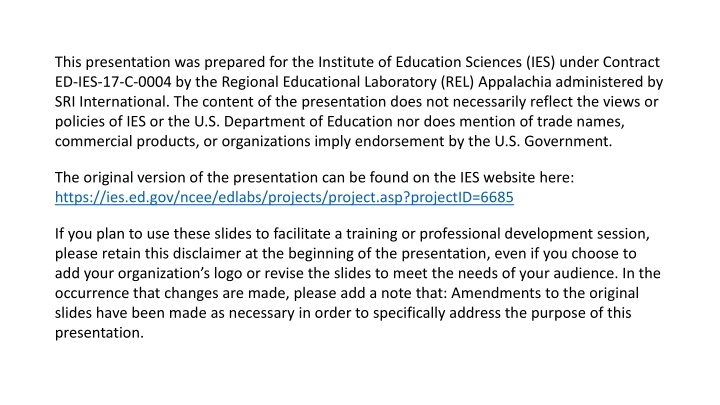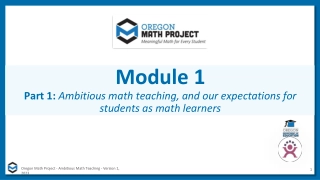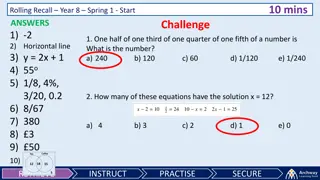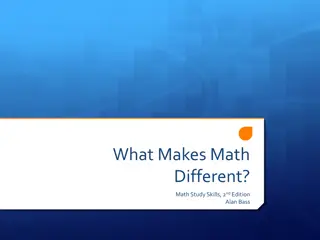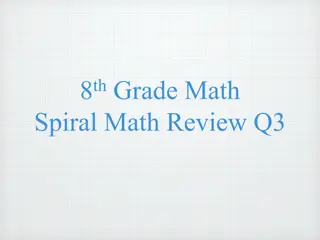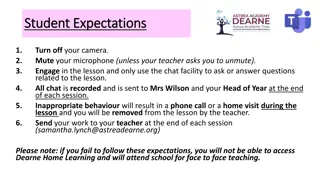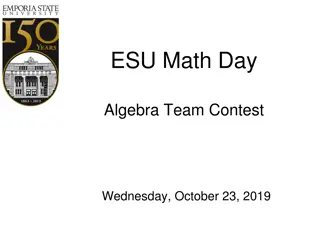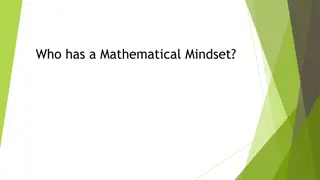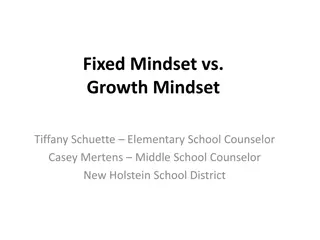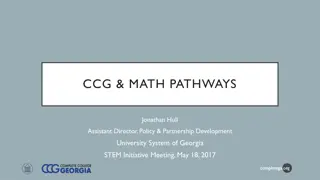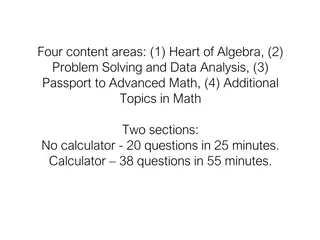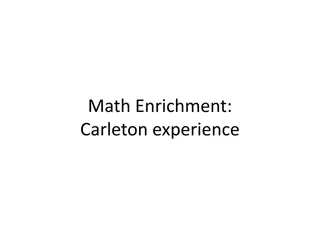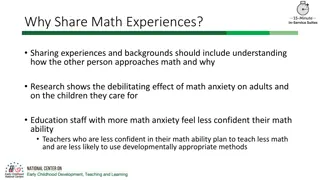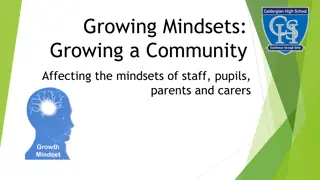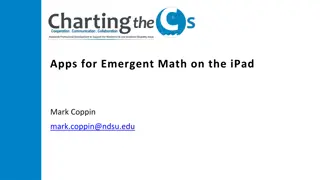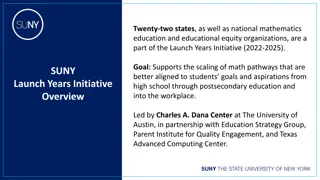The Importance of Math Mindsets in Education
This presentation, created for the Institute of Education Sciences (IES) by the Regional Educational Laboratory Appalachia, emphasizes the significant impact of adult attitudes towards math on children's achievement and motivation in the subject. It delves into the concept of fixed versus growth mindsets, highlighting how fostering a growth mindset can positively influence learning outcomes. By exploring the correlation between adult perceptions and children's success in math, the presentation advocates for promoting a supportive and encouraging environment for students to thrive academically.
Download Presentation

Please find below an Image/Link to download the presentation.
The content on the website is provided AS IS for your information and personal use only. It may not be sold, licensed, or shared on other websites without obtaining consent from the author.If you encounter any issues during the download, it is possible that the publisher has removed the file from their server.
You are allowed to download the files provided on this website for personal or commercial use, subject to the condition that they are used lawfully. All files are the property of their respective owners.
The content on the website is provided AS IS for your information and personal use only. It may not be sold, licensed, or shared on other websites without obtaining consent from the author.
E N D
Presentation Transcript
This presentation was prepared for the Institute of Education Sciences (IES) under Contract ED-IES-17-C-0004 by the Regional Educational Laboratory (REL) Appalachia administered by SRI International. The content of the presentation does not necessarily reflect the views or policies of IES or the U.S. Department of Education nor does mention of trade names, commercial products, or organizations imply endorsement by the U.S. Government. https://ies.ed.gov/ncee/edlabs/projects/project.asp?projectID=6685 The original version of the presentation can be found on the IES website here: https://ies.ed.gov/ncee/edlabs/projects/project.asp?projectID=6685 If you plan to use these slides to facilitate a training or professional development session, please retain this disclaimer at the beginning of the presentation, even if you choose to add your organization s logo or revise the slides to meet the needs of your audience. In the occurrence that changes are made, please add a note that: Amendments to the original slides have been made as necessary in order to specifically address the purpose of this presentation.
Mindsets and Math [Add your school name, date, and any other helpful information]
For full infographic and references see: https://ies.ed.gov/ncee/edlabs/infographics/pdf/REL_AP_Supporting_Your_Child_in_Developing_Math_Skills_for_Future_Success.pdf 4
For full infographic and references see: https://ies.ed.gov/ncee/edlabs/infographics/pdf/REL_AP_Supporting_Your_Child_in_Developing_Math_Skills_for_Future_Success.pdf 5
Math attitudes and a growth mindset 6
Multiple studies suggest that adults reactionsto a child s work will impact the child s achievement and attitudes toward the subject. Adult attitudes toward math can influence a child s math achievement When you have a negative attitude, children may feel you have low expectations of them, which can lead to lower motivation and lower expectations for their own success in math. 7
Math mindset matters Fixed mindset Growth mindset The belief that people are born with the intelligence they have and there is not much you can do to change it. The belief that people can increase their intelligence through hard work and persistence. You can work your brain like your muscles.
Encourage effort and learning 2. You can do it! Let s try another strategy. 1. Not everyone is a math person; you re so good at other subjects.
Praise effort and learning 2. You got a higher grade on this assignment. You must be really smart. 1. You got a higher grade on this assignment. You must have worked really hard.
Capitalize on the power of "yet" I m so disappointed! I worked really hard and still didn t get an A on the assignment. You didn t get an A yet. You learned so much and are now more prepared for the next assignment. Ask your teacher for suggestions on how to improve.
Take home messages Adult attitudes toward math can influence a child s math achievement. Family and teacher feedback is important for math learning. Providing growth-orientedfeedback can help your children succeed at math. Praise effort and learning!
References Achieve, Inc. (2006). Closing the expectations gap: An annual 50-state progress report on the alignment of high school policies with the demands of college and work. https://www.achieve.org/files/50-state-06-Final.pdf Blackwell, L. S., Trzesniewski, K. H., & Dweck, C. S. (2007). Implicit theories of intelligence predict achievement across an adolescent transition: A longitudinal study and an intervention. Child Development, 78, 246 263. Boaler, J. (2015). Mathematical mindsets: Unleashing students' potential through creative math, inspiring messages and innovative teaching. John Wiley & Sons. Dweck, C. S. (2008). Mindsets and math/science achievement. https://www.growthmindsetmaths.com/uploads/2/3/7/7/23776169/mindset_and_math_science_achievement_-_nov_2013.pdf Claessens, A., & Engel, M. (2013). How important is where you start? Early mathematics knowledge and later school success. Teachers College Record, 115(6). Duncan, G. J., Dowsett, C. J., Claessens, A., Magnuson, K., Huston, A. C., Klebanov, P., Pagani, L. S., Feinstein, L., Engel, M., Brooks- Gunn, J., Sexton, H., Duckworth, K., & Japel, C. (2007). School readiness and later achievement. Developmental Psychology, 43(6), 1428 1446. https://doi.org/10.1037/0012-1649.43.6.1428 Epstein, J.L. (2001). School, family, and community partnerships (1st ed.). Westview Press. Siegler, R. S., Duncan, G., Davis-Kean, P. E., Duckworth, K., Claessens, A., Engel, M., Susperreguy, M.I., & Meichu, C. (2012). Early predictors of high school mathematics achievement. Psychological Science, 23(7), 691 697. https://eric.ed.gov/?id=ED552898
